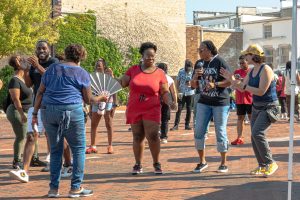Nightmare: hit for DeKalb resident
December 6, 1990
It all started as a nightmare.
The writer dreamt he was in a New York subway station in the middle of the night. He walked up the stairs to the exit and fond the door locked. He ran back down and found the exit also chained.
Then Bruce Joel Rubin woke up. The DeKalb resident soon realized his dream could be the premise of a movie about total paranoia. “I woke up sweating and thinking, ‘What a great idea for a movie!,” Rubin said.
It took him a year to craft the story of deception, murder and conspiracy, a story that would eventually become the recently released “Jacob’s Ladder.” He penned most of his visions of heaven and hell in the study of his beige house at 309 S. Third St. in DeKalb.
“It was difficult for people to come into my room when I was working, because I would literally jump out of my chair. It was the most extreme emotional experience as a writer that I’ve ever been through,” Rubin said. “It was like watching the movie unfold in my brain and putting it on paper as fast as I could.”
“My goal with ‘Jacob’s Ladder,’ was to write the most frightening film I could, to find the essence of fear, not to indulge in some capricious experience but to shake up the audience for a reason,” he said.
Rubin, who would go on to write the hit film “Ghost,” began writing “Jacob’s Ladder” in 1980 without knowing in advance where it would lead him. For almost a decade, the screenplay went admired by Hollywood, but unmade.
It took Adrian Lyne, the director of “Fatal Attraction,” to translate Rubin’s nightmare to the screen.
Born in Detroit, Rubin began writing short stories and plays before he reached his teens. He attended New York University Film School in the early ‘60s. After college, Rubin worked for a time as an assistant film editor at NBC News before traveling through Europe and Asia.
“When I came back to America, I had a great deal of exposure to world religions and spiritual discourses and I found I was most compelled by the similarities rather than the differences. A lot of those similarities have become a subtext in the writing I have done since, including ‘Jacob’s Ladder,” he said.
In the early ’70s, Rubin moved to the Midwest where he and his wife attended graduate school at Indiana University. He continued to write scripts, including the screenplay for what was to become “Brainstorm,” Natalie Woods last film. His writing continued when he moved his family to DeKalb in 1980. His wife, Blanche, taught art at NIU.
Leonard Mandall, assistant dean of the NIU Law School, was a friend of Rubin’s who occasionally shared conversations with him about their shared love: screenwriting. “I remember sitting is his backyard by the garage discussing screenwriting,” Mandall said.
While in Los Angeles to attend the premiere of “Brainstorm,” Rubin finally decided to move to Hollywood. “There he was sitting in DeKalb, waiting to be discovered. He knew he had to make the move,” Mandall said.
Within days of their arrival in Los Angeles in 1984, Rubin got a filmwriting job and has worked steadily ever since.
“It’s amazing that now he’s one of the top screenwriters in Hollywood. It’s a great success story,” Mandall said.
“It’s been the most magical period of my life,” Rubin said.






